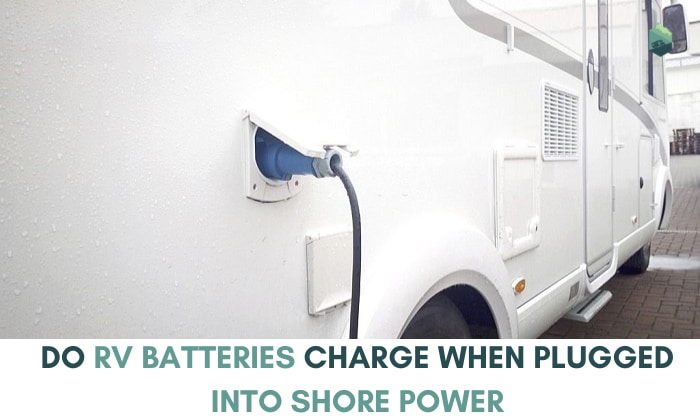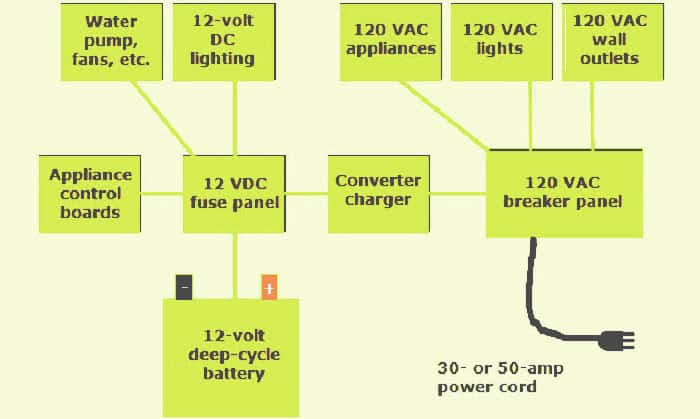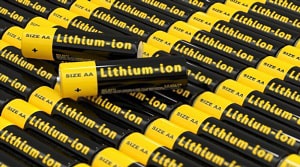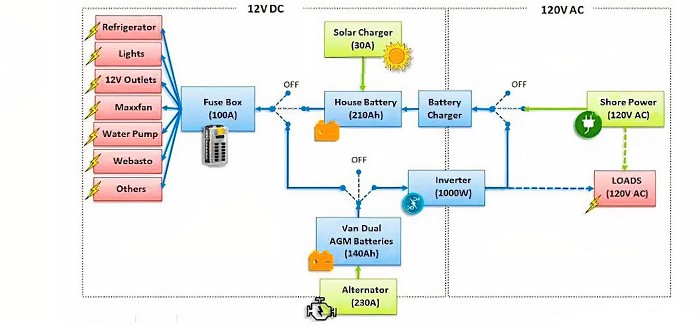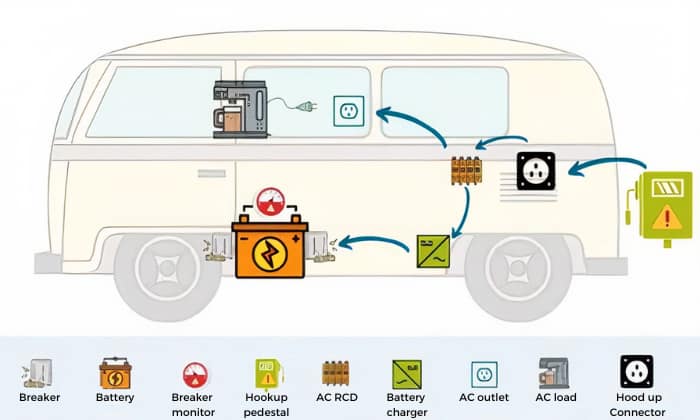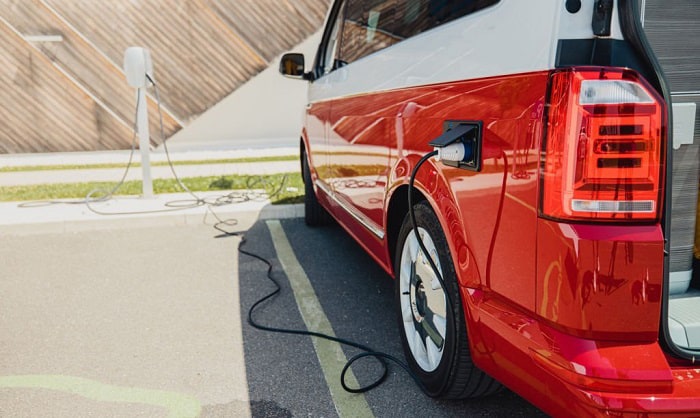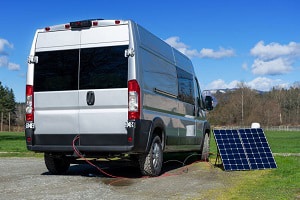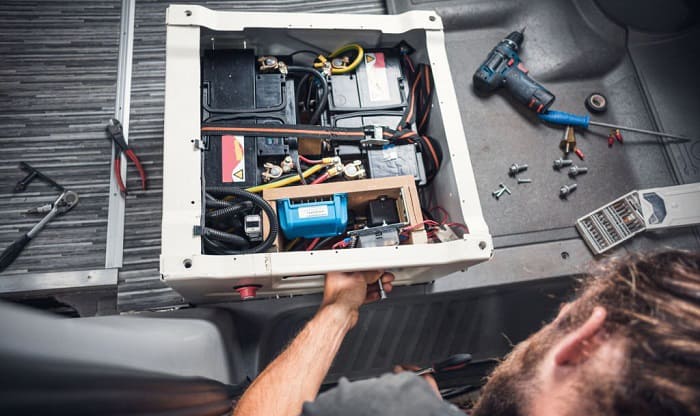Most RVers face this common question, “Do RV batteries charge when plugged into shore power?”
Yes, your camper battery will charge when you connect into shore power. As long as you have a converter in your rig, the AC power from the power pedestal will transform into DC power and charge the battery when you’re plugged in. Make sure that you use the right amp rating for the converter.
Learn more about RV batteries, how they work, and the charging process below.
Page Contents
How Does A RV Battery Work?
The RV battery can power 12-volt direct current (DC) appliances like interior lights, fans, and microwaves. With a converter, this battery can also power your 120-volt AC appliances like televisions and radios. Technically, it serves as a significant part of your electrical systems when you can’t connect your motorhome to shore power.
How it works is simple.
When connected to a power source, like shore power and generator, the battery receives and stores electricity. This battery then discharges the stored electricity once you plug an appliance or any electrical equipment into it. Hence, the battery must have a high capacity and deep discharge rate.
Best Batteries For RV
The qualities of the best RV batteries are longevity, safety, and performance. Here are the different types of batteries for your rig.
- Deep Cycle Batteries: These batteries are perfect for RVs because they can supply long, steady power. Thanks to their thick lead plates, they don’t get easily damaged even when charged and depleted repeatedly. They’re available in three types.
- Flooded Lead-Acid: This type of deep-cycle battery is quite reliable, especially for backup power applications. However, these batteries contain free liquid that needs regular maintenance and shouldn’t be depleted below 50%.
- Gel: These batteries are extremely durable and fully sealed, making them safe to use on the road. However, they need special chargers and may not endure extreme temperatures.
- Absorbed Gas Mat (AGM): Like gel, AGM is also sealed and maintenance-free. They can endure the cold temperature better, but depleting more than half of their capacity will shorten their lifespan.
- Lithium Batteries: Many RVs use lithium batteries because they’re more lightweight and compact yet hold more power than battery types. You can utilize them immediately because they charge fast at a higher amperage.
Because of their deep discharge rate, these batteries can be discharged at 80% without risks of voltage drop. However, these batteries can be pretty expensive.
Understanding The Camper Electrical System
Generally, your RV uses 12V DC and 120V AC power to run your vehicle, appliances, and other accessories. Depending on the situation, it’s essential to switch your power supply from AC to DC or vice versa, so you’ll need inverters/converters.
1. 12-Volt DC Power
The house battery supplies the 12-volt DC power in your rig. It’s responsible for powering the water pumps and other small appliances, like interior lights.
You can choose a single 12V battery or two 6V batteries in parallel to run a 12V electrical system in your rig. If you plan to power more DC appliances, you can put in two 12V batteries to make a 24V system.
If you plan to use a larger appliance like a refrigerator when boondocking, using your house battery can drain its power rapidly. The best solution is to use alternative power sources, such as solar energy—a system that calls for solar panels and charge controllers to generate and regulate electricity.
2. 120-Volt AC Power
The 120V AC system runs most of the large appliances, including the water heater and washing machine. You can get AC electricity from shore power or a generator.
Shore power pertains to the AC electrical grid where you plug your RV. The ratings may vary between 30 amps and 50 amps. You can easily find 30 amp plugs in small campers, while large motorhomes usually have a 50 amp power plug.
When shore power isn’t accessible, you can rely on generators for AC power. Many luxury motorhomes already provide built-in generators for convenience’s sake.
3. Converters/Inverters
Converters are used to transform AC power to DC. You typically use them to run your DC appliances or charge your house battery when hooking up to the campground’s power pedestal.
Meanwhile, inverters are necessary to turn DC to AC power. If you’re off the grid, it’s possible to hook up your AC appliances to the inverter to work.
How Is The Battery Charged When Plugged Into Shore Power?
When you plug your RV into the power pedestal or the 120V electrical outlet, it will make all your AC appliances run onboard. To charge the batteries safely, you’ll need a converter to turn AC power to DC.
Charging RV batteries with shore power also requires the right amp rating. Know whether the campground uses a 30-amp or 50-amp hookup. A 30-amp plugin has three prongs, while a 50-amp plugin has four prongs.
When your RV’s plug isn’t compatible with the campground’s hookup, use an adapter.
1. Adapters For 30-Amp RVs
Suppose you need to hook your 30-amp RV to a 50-amp power pedestal, you’ll require an adapter that turns a 50-amp plug into a 30-amp plug for your rig.
Connect the 30-amp RV cord to the adapter’s 30-amp female end and plug the 50-amp male end into the campground’s power pedestal.
2. Adapters For 50-Amp RVs
To hook your 50-amp RV to a 30-amp shore power, use a 30-amp to a 50-amp RV plug adapter. Make sure that you don’t use too many appliances when using this setup to charge your batteries because it can trip your circuit breaker.
Other Ways To Charge Batteries
When shore power isn’t available, you can charge your RV batteries in other ways. You can choose a generator, solar power, or even your tow truck.
1. Generators
Some motorhomes already come equipped with generators in the cabin, so plugging your RV is the fastest way to charge RV batteries. Keep in mind that generators supply AC power. To charge safely, use a converter like you would with shore power.
2. Solar Energy
Can I charge my RV battery while it is connected to solar panels? You sure can, especially if you’re boondocking in full sunlight. Just make sure that you use the right size of solar panels to charge the batteries fast.
3. Vehicle Alternator
Does my travel trailer battery charge when plugged in my truck? Yes, it does, as long as it has an alternator. When plugged into truck, use a 7-pin travel trailer plug.
Keep in mind that the charging process might be a bit slow because the alternator isn’t meant to be an RV battery charger.
Care And Maintenance RV Batteries
The key to prolonging the life of your camper batteries is to conduct proper care and maintenance. Here are some helpful tips.
- Keep motorhome batteries charged at least 80% when in storage.
- Check the battery cables, vent caps, and connectors regularly. Everything should be intact at all times.
- Make sure that the batteries are free of rust and dirt.
- If using flooded lead-acid batteries, replenish the water to ensure proper function. Use distilled water as possible.
- Avoid discharging the batteries below 50%, especially if it’s flooded lead acid or AGM batteries.
- Use a proper charger for your RV battery.
Frequently Asked Questions
RV house battery or engine battery: what is the difference?
An engine battery helps power your RV’s motor to start running, while an RV house battery supplies 12V power to interior lights and other small appliances.
In addition, to start the motor, the engine battery needs a large rate of cold cranking amps in short bursts. On the other hand, a house battery needs long, steady power to work.
You can utilize a camper battery charge when plugged in shore power and generator. However, these two external power sources can’t charge the engine battery. It’s possible, though, to have a motorhome engine battery charge when plugged into an external battery charger.
How long does it take to charge RV batteries on shore power?
Motorhome battery charging usually takes a long time. Expect the charging process to last 10–40 hours, depending on the size of the battery. Group 24 batteries charge the fastest—around 5 hours, while Group 31 takes the longest time to charge—at least 15 hours.
Can I use shore power to charge my RV battery at RV campgrounds for free?
Most campground shore power charge RV batteries without a fee. To be sure, ask the campground official beforehand whether they’ll require a fee.
Should I get a surge protector or monitor for my RV?
For the protection of your appliances or other devices hooked up in the rig, you’ll need a surge protector or monitor to shield against harmful electrical issues. The power grid isn’t the only factor that can cause voltage problems. Lightning from storms can also harm your appliances with power surges.
Why is my RV battery not charging while plugged in the shore power?
Look at the battery terminals to see whether they’re corroded or not. Corrosion is one of the main culprits of poor battery connections. Also, the converter itself may be damaged.
Conclusion
Do RV batteries charge when plugged into shore power? You sure can, along with other charging methods like generators, alternators, and solar power. Use a method that you think fits your best situation.
To help extend the life of your camper batteries, make sure to use them properly. Always use the right charger for your battery.
Let us know your thoughts about this article below. If you like, you can share it with your friends and family.
“Hi, I’m Francis’ husband—Calvin. Our story began with our shared passion for traveling. I have had a career journey for over 11 years at Ford Motor Company, where I took on the role of BMS SW Process Engineer.
Together with my wife, I have dedicated countless hours to exploring every nook and corner of the world. Ten years living in an RV may seem long, but time seems to fly by when I’m doing what I love with the person I love.
FMCA’s 103rd International Convention & RV Expo in Gillette, WY,
Like my wife, I hope to help you see the beauty of traveling off the beaten path by sharing insights into this lifestyle. In addition to my corporate roles, I also launched our website – Outdoorbits, in 2015 and continue to contribute my knowledge and skills to the present day. And I’ll be completely honest with you—no hiding the truth or sugarcoating the possible challenges.
So, if you want to run away from the busy lifestyle to embrace nature, I’m your guy.”
